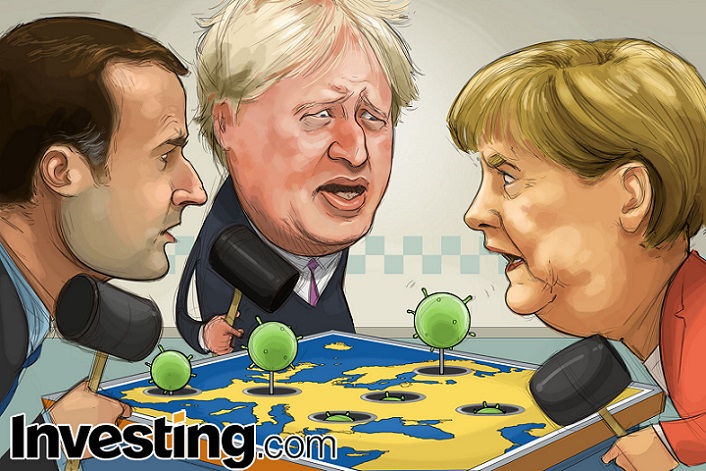By Geoffrey Smith
Investing.com -- Europe’s Covid-19 epidemic is threatening to spiral out of control again.
Governments across the continent are tightening restrictions on gatherings and non-essential economic activity, hoping to avoid the need to lock their economies down entirely as they did in the spring.
With the Eurozone economy set to shrink by over 8% this year, and the U.K. one poised to shrink by 10% or more, governments are walking a fine line between trying to keep their economies as open as possible without allowing the coronavirus to rip through their populations and swamp their public health systems.
In the U.K., new infections have averaged around 14,000 a day for the last week, more than double their peak during in the first wave in the spring. While that’s due in part to much more widespread testing than in the spring, hospital admissions and deaths (for which there are no false positives) are also on the rise.
Boris Johnson’s government rolled out a new three-tier scheme for tightening restrictions on gatherings and economic activity, aiming to bring clarity and rigor to an overall policy response that has often seemed haphazard and chaotic.
However, the announcement was undercut by the government’s own top health advisor, who said even the most restrictive tier of measures probably won’t be enough to stop the disease spreading more widely as winter progresses.
In France, meanwhile, the number of Covid-19 patients in hospital intensive care units is back at its highest in three months. Prime Minister Jean Castex said the battle with the virus is set to last “several months more.” Castex is hobbled by a long-overlooked clause in the French constitution which doesn’t let the government limit gatherings of a family at home.
Infection curves have also steepened dramatically across central Europe, from Slovenia to the Czech Republic and Poland. Only in Germany does the virus still seem truly under control – and even there the authorities are sounding alarm bells. Restrictions on bars and restaurants in Berlin and Frankfurt were tightened last week as infection rates climbed.
The corresponding slowdown in economic activity (Germany’s ZEW sentiment index plunged to its lowest since May on Tuesday) is also alarming central bankers: ECB President Christine Lagarde said the recovery looked “shaky” last week, stoking expectations that it will increase the size of its Pandemic Emergency Purchase Program at its December council meeting. The Bank of England, meanwhile, has sounded U.K. banks out about their preparedness in case it cuts official interest rates below zero for the first time.
